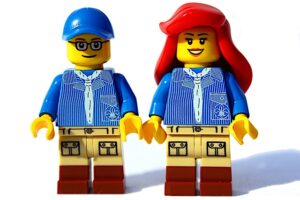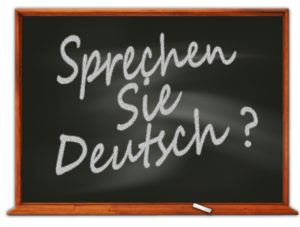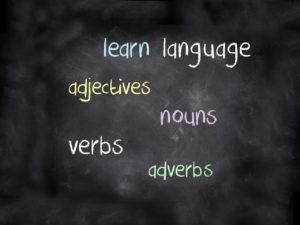Verbs are actions or a state of being.
- An example of an Action is, I eat.
- An example of a state is, I am hungry or I have pain.
In Afrikaans you would say “Ek eet” , “Ek is honger” or “ek het pyn”
The verbs change their form depending on the Pronoun before the verb. These are words like I, me, she, you, it, they, and us. In English we use I am hungry but he is hungry. In German all verbs change depending on the pronoun, not just the sein (is/am) Hilfsverb.
Examples of relative pronouns are: which, that, whose, whoever, whomever, who and whom, and many
| Pronoun | Verb haben (have) Hillfsverb |
Verb sein (is) Hillfsverb |
Verb komme Vollverb |
Verb wollen (want to) Modalverb |
| Ich (I) | habe | bin | komme | will |
| du (you) | hast | bist | kommst | willst |
| er, sie, es (he, she, it) | hat | ist | kommt | will |
| wir (we) | haben | sind | kommen | wollen |
| Ihr (you) | habt | seid | kommt | wollt |
| Sie (they) | haben | sind | kommen | wollen |
| Sie (Formal you) | haben | sind | kommen | wollen |
Conjugation
The conjugation is the change of the verb forms in terms of person, number, time, etc.
In the German conjugation (Konjugation) system one can distinguish three main types of verbs: regular verbs (regelmäßige Verben), irregular verbs ( unregelmäßige Verben) and verbs with mixed conjugation ( Verben mit gemischter Konjugation )
Conjugation is the creation of derived forms of a verb. Conjugated verbs are used to express the characteristics of person, number, tense, voice and mode in the German language. In order to form the forms, the division into regular and irregular Verbs is fundamental. Irregular verbs are, for the most part, strong verbs. The creation of verb forms deviates from regular conjugation. The regular verbs are all from the class of weak verbs. For the formation of the verb forms, the separability of prefixes and the auxiliary verb to be used is also relevant.
1. Regelmäßige Verben
Never change the root vowel during conjugation
ich mache – ich machte – ich habe gemacht
2. Unregelmäßige Verben
Change the main vowel and have different endings in the Past Tense (Präteritum) and the past particle (Partizip Perfekt) than that of regular verbs.
ich gehe – ich ging – ich bin gegangen
3. Gemischte Verben
Mixed Verbs also change the root vowel, but have regular endings.
ich denke – ich dachte – ich habe gedacht
Reflexive Verben
Reflexive Verben sind Verben, die mit einem Reflexivpronomen (sich) in der Bedeutung von „sich selbst“ verwendet werden. Es gibt echte, unechte reflexive Verben und teilreflexive Verben.
Reflexive verbs are verbs that are used with a reflexive pronoun (meaning) in the sense of “oneself”. There are real, fake reflexive verbs and partially reflexive verbs.
Beispiel: Ich wasche mich.
Vollverb
Die meisten Verben des Deutschen sind Vollverben. Ein Vollverb ist ein Verb, das alleine (neben dem Subjekt) in einem Satz stehen kann. Vollverben drücken Handlungen oder Zustände aus.
Most verbs in German are full verbs. Can stand alone in sentence (next to a subject) Express actions or states
“Ich lerne Deusch
Hilfsverben
Hilfsverben bilden das Prädikat nur in Verbindung mit dem Partizip, Perfekt oder dem Infinitiv eines Vollverbs. Sie ermöglichen die Bildung der zusammengesetzten Zeitformen.
Ich bin gelaufen. Du hast gegessen. Sie wird rennen
Habe und Sein
| Präsens | Präsens | Präsens | Präteritum (simple past) |
Präteritum (simple past) |
Präteritum (simple past) |
|
| Sein | Haben | Werden | Sein | Haben | Werden | |
| Ich | Bin | Habe | Werde | War | Hatte | Wurde |
| du | Bist | Hast | Wirst | Warst | Hattest | Wurdest |
| er, sie, es | Ist | Hat | Wird | War | Hatte | Wurde |
| wir | Sind | Haben | Warden | Waren | Hatten | Wurden |
| ihr | Seid | Habtz | Werdet | Wart | Hattet | Wurdet |
| Sie / sie | Sind | Haben | Werden | Waren | Hatten | Wurden |
Modal Verben
A modal verb (also ‘modal’, ‘modal auxiliary verb’, ‘modal auxiliary’) is a type of verb that is used to indicate modality – that is, likelihood, ability, permission, and obligation. Examples include the English verbs can/could, may/might, must, will/would, and shall/should.
Können, Wollen, Müssen, Dürfen. Mochten, Sollen, Mögen
Präsens (Present Tense)
| Dürfen | Können | Mögen | Müssen | Sollen | Wollen | Möchten | |
| Ich | Darf | Kann | Mag | Muss | Soll | Will | möchte |
| du | Darfst | Kannst | Magst | Must | Sollst | Willst | möchtest |
| er, sie, es | Darf | Kann | Mag | Muss | Soll | Will | möchte |
| wir | Dürfen | Können | Mögen | Müssen | Sollen | Wollen | möchten |
| ihr | Dürft | Könnt | Mögt | Müsst | Sollt | Wollt | möchtet |
| Sie / sie | Dürfen | Können | Mögen | Müssen | Sollen | Wollen | möchten |
Präteritum (Simple Past Tense)
| Dürfen | Können | Mögen | Müssen | Sollen | Wollen | Möchten | |
| Ich | durfte | konnte | mochte | musste | sollte | wollte | wollte |
| du | durftest | konntest | mochtest | musstest | solltest | wolltest | wolltest |
| er, sie, es | durfte | konnte | mochte | musste | sollte | wollte | wollte |
| wir | durften | konnten | mochten | mussten | sollten | wollten | wollten |
| ihr | durftet | konntet | mochtet | musstet | solltet | wolltet | wolltet |
| Sie / sie | durften | konnten | mochten | mussten | sollten | wollten | wollten |
Related content

Pronouns
Pronouns are words that take the place of a noun. Words like I, me, she, you, it, herself. Additionally, you get Relative and possessive pronounsRelative

German Grammar and Language
Here are some links to German Grammar information.It is a compilation of information I gathered over time. I hope you find it useful. Please notify

Learning German
There are several approaches to learn German, all of which can help you achieve your language learning goals. You can opt for convenient online sites


You must be logged in to post a comment.